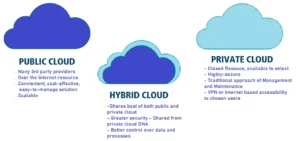Choosing the right cloud model is a crucial decision that impacts your business’s scalability, security, cost, and flexibility. Each model—public, private, or hybrid—offers unique advantages, and the best fit depends on your specific needs, resources, and industry regulations.
What it is:
A public cloud is hosted and managed by third-party providers like AWS, Azure, or Google Cloud. You share computing resources with other users on a pay-as-you-go basis.
Best for:
-
Startups and SMBs
-
Businesses needing rapid scalability
-
Non-sensitive workloads
-
Development and testing environments
Pros:
-
Low upfront cost
-
Easy to scale
-
High availability
-
Minimal maintenance
Cons:
-
Less control over infrastructure
-
Shared resources may raise security concerns
-
Data compliance challenges for regulated industries

2. Private Cloud: Secure and Customizable
What it is:
A private cloud is dedicated to a single organization, either on-premises or hosted by a third party. It offers greater control and customization.
Best for:
-
Large enterprises
-
Regulated industries (finance, healthcare, government)
-
Businesses with high-security demands
Pros:
-
Enhanced security and compliance
-
Full control over infrastructure
-
Customizable environment
Cons:
-
Higher cost
-
Requires more IT resources
-
Less scalable than public cloud
3. Hybrid Cloud: Flexible and Balanced
What it is:
A hybrid cloud combines both public and private clouds, allowing data and applications to move between them based on need, policy, or security.
Best for:
-
Businesses needing both security and flexibility
-
Organizations undergoing cloud migration
-
Workloads that vary in sensitivity
Pros:
-
Optimized cost and performance
-
Scalable and secure
-
Business continuity and disaster recovery flexibility
Cons:
-
Complex to set up and manage
-
Requires strong integration and orchestration tools
-
Potential for data silos if not managed properly
How to Decide?
Ask yourself these questions:
-
What are my security and compliance requirements?
-
Do I need rapid scalability or full control?
-
What’s my budget and in-house IT capability?
-
Am I planning to modernize or integrate with legacy systems?
Conclusion
The best cloud model isn’t one-size-fits-all. Public cloud offers scalability and affordability, private cloud ensures control and security, and hybrid cloud gives you the best of both. Assess your goals, evaluate your workloads, and choose the model that aligns with your growth and compliance needs.









